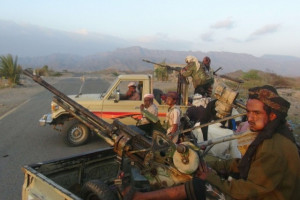
These revelations have been published a few days ago by the Washington Times, which mocks Washington’s official statement that was given in response to the remarks made by the Russian Defense Ministry, that allowing terrorists to sell oil freely is a direct violation of a number of UN Security Council resolutions.
In turn, Russia’s warplanes have been inflicting serious damage on ISIL in Syria over the last two months, effectively undermining the source of its funding. This step has put Washington in a peculiar position, forcing it to start destroying oil facilities and vehicles run by the Islamic State in Iraq in a desperate attempt to avoid an imminent PR disaster.
Under these conditions, while suffering huge human and financial losses due to the combined assault of Russia’s aircraft and Syrian regular troops, the Islamic State is now forced to turn its attention to other Muslim states, seeking any means to get the cash flowing back in. That is why in November the leaders of ISIL began urgently planning “active expansion” in Libya, a nation rich in hydrocarbons, as well as in Afghanistan.
Although Afghanistan has no oil or gas reserves worth mentioning, ISIL still could use it as a means to replenish its rapidly vanishing financial wealth, since there are still many opportunities there through criminal activities to make significant fortunes.
As one must know, Afghanistan holds the unsavory title as international leader in the production and export of opiates in the world. Last year Afghanistan has sold 85% of all opium and 77% of all heroin worldwide. Cultivation of opium is one of the key areas of economic activity in Afghanistan. In 2014 opium harvests in Afghanistan reached a staggering 6.4 tons, while the gross value of opium production amounts to 13% of the Afghan GDP. According to local officials, the terrorist groups that run this business receive an annual profit of 70 billion dollars, while the Taliban is getting a relatively small share of about 2 billion dollars a year.
Today 2.5% of the adult population of this Central Asian state are drug addicts, which is one of the highest rates in the world. Still, it keeps getting worse, as vast areas where opium poppy is cultivated has increased by an additional 7% this year, reaching 224 thousand hectares. The rate of opium production has also in just a year increased by 17%.
A massive leap in the production and smuggling of opiates was observed immediately after the US invasion of Afghanistan, which has already been noted by a number of countries around the globe. The Taliban is playing a crucial role in ensuring that the production and export of opiates from Afghanistan continues on uninterrupted.
The staggering profits that terrorists are getting through the drug trade in Afghanistan are perceived by ISIL’s leaders as the perfect “opportunity” to establish a steady flow of funds for their own ends. Under these circumstances the bitter rivalry between the Taliban and the Islamic State in Afghanistan is perfectly understandable. ISIL is seeking ways to subdue other extremist groups to get as many militants to join its ranks as possible. There is evidence that a group of ISIL militants has already established control over the illegal drug trade in the Afghan province of Badakhshan.
It’s often the case that the one who has more armed men under his command controls this incredibly profitable business in Afghanistan. And ISIL has everything it takes to get the upper hand in the fight with the Taliban to take over the lucrative opiate business in Afghanistan.
In this regard, it should be noted that the operation of the international coalition in the fight against ISIL has to do whatever it can to prevent this terrorist group from expanding its influence. There is an urgent need for the establishment of an appropriate coordinated effort among the international community to prevent the Islamic State from obtaining new sources of income in Afghanistan.
Martin Berger is a Czech-based freelance journalist and analyst, exclusively for the online magazine “New Eastern Outlook.
